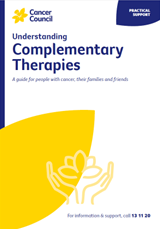- Home
- About Cancer
- Living well
- Complementary therapies
- Safety concerns
Safety concerns
This section explores safety concerns related to using complementary therapies for cancer.
Learn more about:
- Are complementary therapies safe?
- Warning signs to look out for
- Telling your doctors about using a therapy
- Safety of herbs
- Safety of oils used in bodywork
- Regulation of medicines
- Regulation of complementary therapists
- What can I do if something goes wrong?
Are complementary therapies safe?
Some studies have found some complementary therapies to be generally safe to use together with conventional cancer treatments and medicines. However, some complementary therapies can affect the way conventional cancer treatments and medicines work, and even stop them working altogether.
All therapies have the potential to cause injury or harm. When trying anything new, discuss with your doctor and therapist whether it is suitable for you and whether you need to take any safety precautions. Some common safety issues include:
Mind–body practices
Sometimes people feel overwhelmed by the emotions they experience during or after a session. This usually settles soon afterwards. If not, contact your therapist for further support.
Body-based practices
If you have cancer in the bones, or bruise or bleed easily, you may need to take care when using body-based practices such as acupuncture and massage.
Herb and plant-based therapies
People often think natural products are safe, but this isn’t always true. Some herbs can interact with conventional cancer treatment or medicines, and change how they work or how the dose is absorbed.
Some complementary therapists do not need to have any specific qualifications to practise. To reduce the potential for harm, always check the practitioner is qualified.
→ READ MORE: Warning signs to look out for
Meditation and Relaxation Podcast
Listen to more of our meditation and relaxation podcast for people affected by cancer
More resources
Dr David Joske, Clinical Haematologist, Sir Charles Gairdner Hospital and PathWest, Chairman and Founder Solaris Cancer Care Foundation, Clinical Professor of Medicine, The University of Western Australia, WA; Australasian Integrative Medicine Association (AIMA); Dr Robert Blum, Clinical Director, Cancer Services, Bendigo Health, NSW; Sally Brooks, Senior Pharmacist, Medicines Information, Peter MacCallum Cancer Centre, VIC; Dr Suzanne Grant, Senior Research Fellow, NICM Health Research Institute, Western Sydney University, and Chris O’Brien Lifehouse, NSW; Prof Danforn Lim, Adjunct Professor and Advisory Board Member, NICM Health Research Institute, Western Sydney University, and Adjunct Professor, UTS, NSW; Christina Line, Statewide Services Senior Coordinator, Cancer Council WA; Jen McKenzie, Physiotherapist (Lymphoedema) and ESSA Accredited Exercise Physiologist, The McKenzie Clinic, QLD; Simone Noelker, Wellness Centre and Pastoral Care Manager, Ballarat Regional Integrated Cancer Centre, VIC; Dr Nirzari Pandit, General Practitioner, RACGP Specific Interests Integrative Medicine Group, NSW; Georgie Pearson, Consumer; Cris Pirone, Counsellor, Cancer Council SA; Dr Elysia Thornton-Benko, Specialist General Practitioner, and UNSW Research Fellow, NSW; Kirsty Trebilcock, 13 11 20 Consultant, Cancer Council SA.
View the Cancer Council NSW editorial policy.
View all publications or call 13 11 20 for free printed copies.

